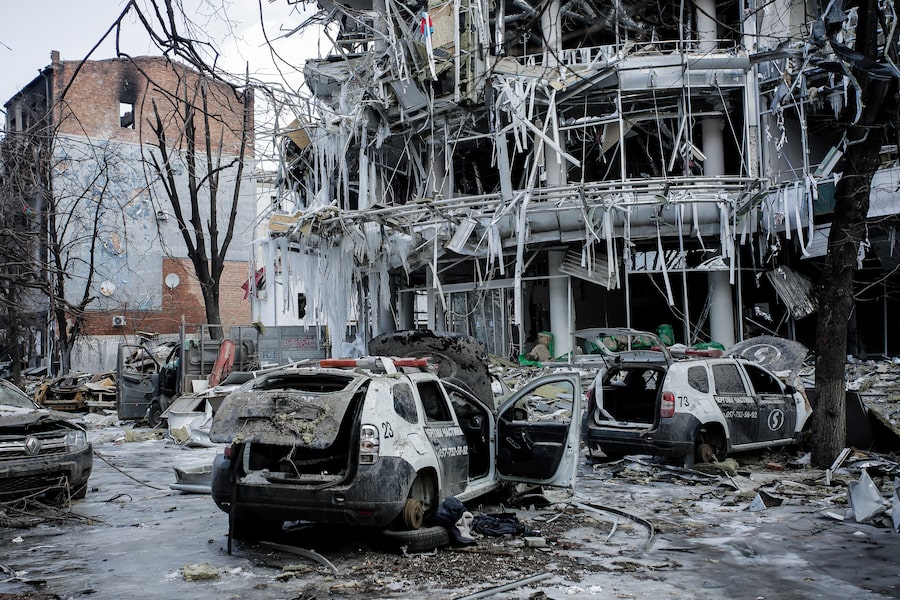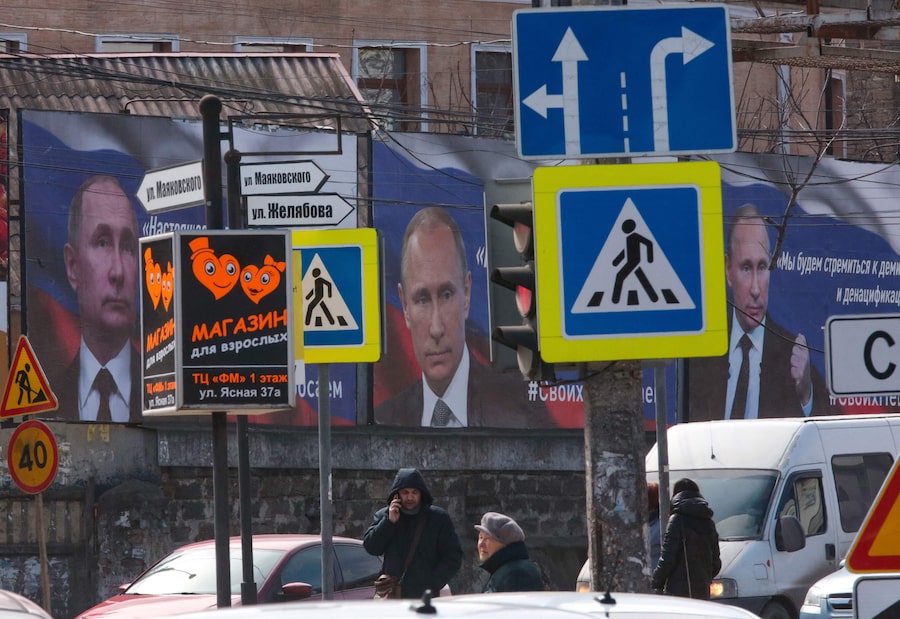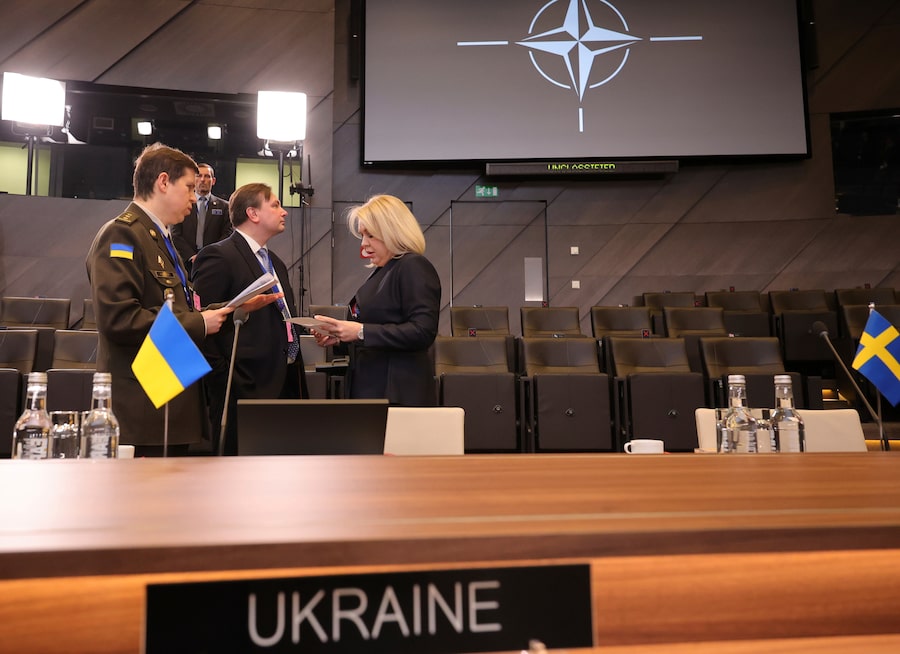
People demonstrate in support of the Ukraine outside the United Nations' top court in The Hague, Netherlands, on March 16.Peter Dejong/The Associated Press
An international court has ordered Russia to stop the war in Ukraine immediately, leaving enforcement an open question as attacks continue.
The International Court of Justice, the top legal body of the United Nations, voted 13-2 on Wednesday to make the order. A judge from Russia and a judge from China were the only dissenters, saying the court lacks jurisdiction.
Harold Hongju Koh, a lawyer for Ukraine, explained the country’s strategy for making constructive use of the court order, in an interview with The Globe and Mail: Encourage China to advise Russian President Vladimir Putin to negotiate; weaken Mr. Putin’s leverage in negotiations; and push for a UN-authorized peacekeeping force, beyond Russia’s power to veto, that would patrol humanitarian corridors in Ukraine.
“Outlaws have weaker hands in negotiations,” said Prof. Koh, the Sterling Professor of International Law at Yale University. “If that scares off the Chinese, he’s more isolated. At which point, Ukraine’s bargaining position is improved.”
The ruling is a kind of injunction – an emergency order – in response to a request from Ukraine, which said Russia falsely accused it of genocide as a pretext for an illegal war. Under the UN’s 1948 Genocide Convention, member states can ask the court to settle disputes over whether a genocide is under way.
Mr. Putin, in two statements in February, said the country was launching a “special military operation” to protect nearly four million Russian-speaking people in eastern Ukraine from genocide. Russia chose not to participate in the court’s hearing on March 7, but it did file a document asserting that the court lacked jurisdiction. Russia’s table in the courtroom was once again conspicuously empty on Wednesday as Chief Justice Joan Donoghue of the United States read from the ruling.
The court said it has not seen evidence that a genocide is occurring against Russian speakers in Ukraine, and it said it doubts that the Genocide Convention authorizes a member’s unilateral use of force to prevent or punish a genocide.
It ruled that a risk of irreparable harm exists to the Ukrainian people.
“Indeed, any military operation, in particular one on the scale carried out by the Russian Federation on the territory of Ukraine, inevitably causes loss of life, mental and bodily harm, and damage to property and to the environment,” Chief Justice Donoghue read in a webcast of the seven-page summary of the ruling, later posted on the court’s website.
“The court considers that the civilian population affected by the present conflict is extremely vulnerable. … Many persons have no access to the most basic foodstuffs, potable water, electricity, essential medicines or heating. A very large number of people are attempting to flee from the most affected cities under extremely insecure conditions.”
The court’s judges represent a wide swath of the world: apart from the U.S., Russia and China, the members are from France, Slovakia, Morocco, Jamaica, Brazil, Somalia, Uganda, India, Lebanon, Japan, Germany and Australia.
Prof. Koh, Ukraine’s counsel, said Ukraine’s strategy is to seek enforcement at the UN Security Council; if Russia blocks the attempt, Ukraine would take the matter to the General Assembly, and push for peacekeepers to protect humanitarian corridors, with access granted by Ukraine.
Darryl Robinson, who specializes in international law at Queen’s University in Kingston, called peacekeeping in humanitarian corridors an intriguing idea. Generally, he said, UN peacekeeping missions must be authorized by the UN Security Council, where Russia has a veto. The General Assembly has acted, however, where the Security Council is paralyzed by a veto, by using what is called a “Uniting for Peace” resolution.
“What makes this idea even more viable is that it does not call for the use of force and it is with the invitation of the host state Ukraine,” Prof. Robinson said.
He added that the International Court of Justice ruling further isolates Russia and combats disinformation. “For states and individuals still believing Russia’s version, or who are unsure what to believe, here is a bench of 15 judges from all the different regions of the world, making a decisive 13 to two ruling. It is as impartial a referee as this world can offer.”
Prof. Koh said in the wake of the ruling, China should reconsider what he called its passive support of Russia’s actions. “Given that the court has overwhelmingly said the conduct is presumptively illegal, do they really want to be associated with it? The real conversation that should happen is for the Chinese to advise Putin: ‘Your use-of-force approach is not succeeding.’” China, he said, “is part of the UN system, too.”
Prof. Koh agreed the ruling continues the isolation of Mr. Putin and Russia. “It brands him an outlaw, it isolates him, it strengthens the case for more sanctions against him based on illegality, and it leaves the door open for accountability at various tribunals, as they get organized to prosecute.”
Lynette Ong, an Asia specialist at the University of Toronto’s Munk School of Global Affairs and Public Policy, said in an interview she doubted the ruling would have an impact on China’s actions.
“It doesn’t see it as an invasion of Ukrainian sovereignty. I don’t think [the ruling] is going to influence their behaviour one way or the other.”
Our Morning Update and Evening Update newsletters are written by Globe editors, giving you a concise summary of the day’s most important headlines. Sign up today.











 Sean Fine
Sean Fine